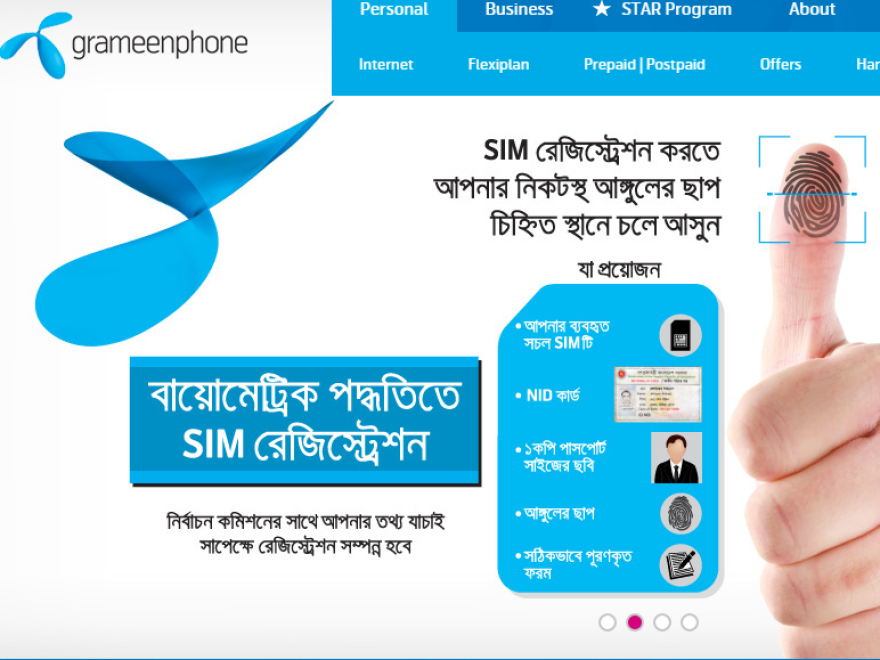For many years, cellphone operators around the world have complained about Facebook and Google: The American tech giants use the operators' cables and towers to hand out free phone calls and messaging services to people in their countries, eating into profits and grabbing customers' data.
Recently, one operator, Telenor, decided: If you can't beat 'em, join 'em. And in the process, it hunted down the kind of link between people's digital and physical personas that not even Google has.
After A Terrorist Attack, A Fingerprint Drive
The realization came in an unusual, even troubling way: a terrorist attack.
You might remember seeing the news footage from northern Pakistan. Telenor Pakistan CEO Michael Foley recounts the events of Dec. 16, 2014.
"There was a horrendous event in Peshawar where there was a school attacked by very bad people. And they killed over 100 young students," recalls Foley, who lives in Pakistan with his wife and three daughters.
The government faced a big problem: "They were not able to really identify who was actually the people owning the phones and getting instructions while they were in the middle of the attack," Foley says.
In the United States, the FBI can't unlock the iPhone of one of the San Bernardino shooters. In Pakistan, law enforcement had a hard time figuring out who even bought the phones used in an attack.
For years, they'd talked about this problem, of not really knowing who owns each SIM card — the tiny card inside phones in much of the world that connects people to the mobile network and the Internet. And for a long time, the government talked about how to fix it with Foley, the CEO of a leading SIM card seller.
"The only thing that happened after the 16th of December was a very strong political and social will to get this done and sorted once and for all," Foley says.
And that's not a small thing.
Citizens are going into Telenor stores every day or every other day to put more money and minutes on their cards. So the company and the government devised a plan to get store clerks to fingerprint every customer and put those prints into an existing national database called NADRA.
This fingerprint drive by a mobile carrier — the equivalent of an AT&T or a Verizon — was the first of its kind in the whole world. However, the plan proved to be very expensive.
"We actually stopped selling SIMs to get this over with as soon as possible," Foley says.
According to Telenor, it took them about four months to register 50 million to 60 million people. While it cost the business, in the end, that drive was a gift of sorts.
"What that did," says Foley, "is provide a real close link — a very, very solid link — between the owner of the SIM card and their identity."
In Asia, A Unique Position
On a stage in Barcelona last week, Foley's boss and Telenor Group CEO Sigve Brekke spelled out what the Pakistan story means for business.

In a keynote at the Mobile World Congress, an annual gathering of the largest mobile operators, the Norwegian businessman told his peers something surprising, albeit obvious: American tech giants are not the only ones that can follow people around online, collect and sell personal data; Telenor can, too, maybe even better.
"We [can] offer much more knowledge about the customers to third party content providers," he says, in a bit of industry jargon.
In an interview with NPR, Brekke laid out his plans, specifically in Asia, which is projected to be the fastest-growing Internet market in the world, according to industry association GSMA.
First of all, "there is no other alternative to connect to Internet than through your mobile network," Brekke says. That's true in much of the continent. That means Facebook and Google need his company to operate in the absence of fixed lines, broadband and Wi-Fi. "So in that sense, it makes our position stronger."
Secondly, many people in Asia don't have credit cards. "The mass markets in Asia are cash driven," Brekke says, "because they don't have any banking relations."
Telenor has created mobile money — a way to text or email cash — which means Telenor gets to see exactly whom you're paying or what you're buying online. Facebook and Google don't have that widescale power.
And thirdly, he's got brand power. Customers go into his stores all the time to reload, to troubleshoot. "So there's a lot more relationships and activity between the operator or the carrier and the customers," Brekke says.
Google and Facebook have to guess who you are. (They've got what the ad industry calls inferred data.) Telenor — newly aided by governments worried about security — is becoming a central repository for names, addresses, finances, and in the near term, Brekke anticipates, health and education records as well.
Bangladesh is having Telenor lead an identification drive in that country, and Brekke says, he's talking to other regulators in Asia about doing the same.
"I don't want to compete with Google or Facebook," he says, demurely, "but what I'm trying to say here is that in these emerging markets, we have a unique position."
And a unique responsibility: To operate in different countries, Norway-based Telenor is required to incorporate locally, pay taxes and be fully subject to the rule of law wherever it is, be it Pakistan, Bangladesh or Myanmar, democracy or dictatorship.
That also means that the more data the company collects, the more a government can collect from it. And the rules around "lawful interception" vary tremendously, country to country.
Does the move into Big Data, then, put Telenor in uncharted and tricky territory? Brekke says, the short answer to that is definitely yes.
"And that is what makes our business also very complicated."
Copyright 2021 NPR. To see more, visit https://www.npr.org.








